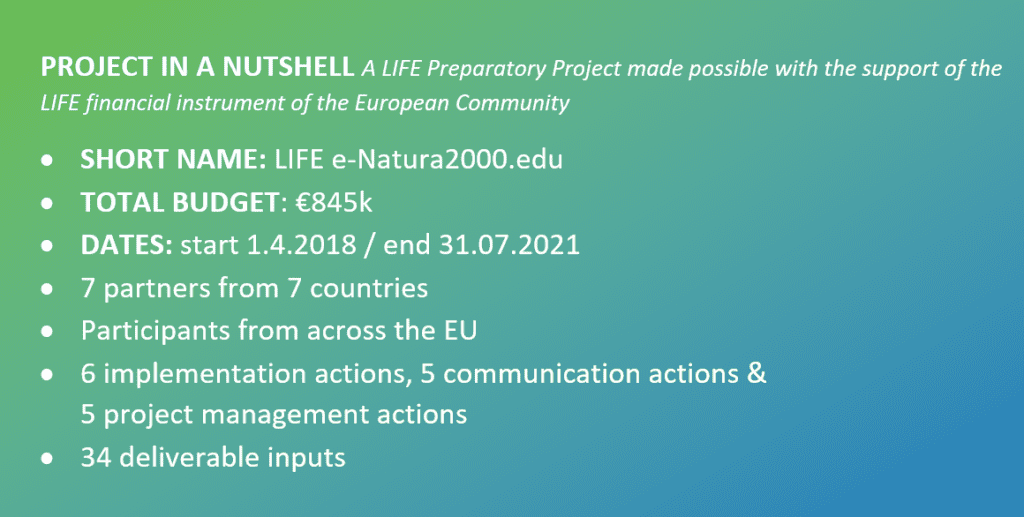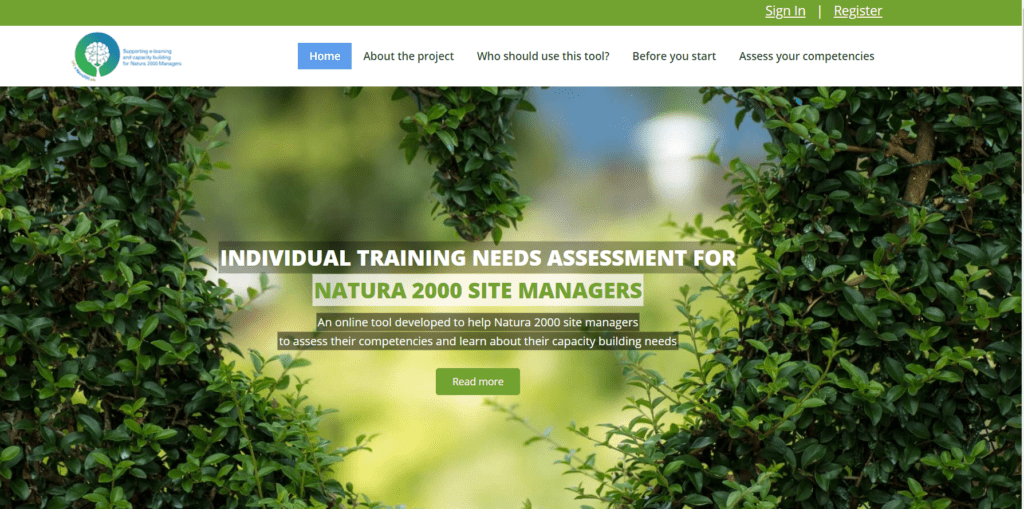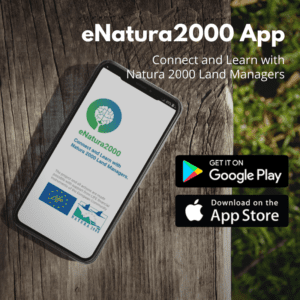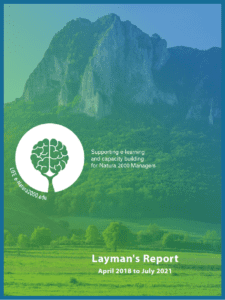LIFE e-Natura2000.edu: Layman’s report
The LIFE e-Natura2000.edu project’s overall goal was to demonstrate the need for and value of creating competence-based continuous professional development programmes directly linked to EU priorities for nature. Layman’s report presents the project’s experiences, main conclusions and a set of recommendations important for future competence-based learning initiative.
The main aim of the project was to produce and test a flexible mix of blended learning tools and methods, designed to build and develop the specific competencies required for effective Natura 2000 management practices.
The competence-based approach was central to the project’s capacity building objectives and applied to benefit more effective (stronger and improved) practical implementation of the Nature Directives.

How LIFEedu worked
Project participants
A small group of 75 managers in both private and public sites were selected to join the project. Demand for places was high, but the project objectives were to work with a limited intake so that the tools and approaches could be thoroughly tested and evaluated.
As evidenced by the project evaluation results, all learning components and tools presented achieved very high levels of recommendation: participants’ feedback was extremely positive with 96% saying that they either are or were shortly planning to apply their learning in their work.
All the digital documents, presentations, references, videos have been very useful. I am already sharing and using them as working materials for other projects.
New tools
As a LIFE Preparatory project, a key goal for LIFEedu was to pilot its methods and tools and make results available to all interested in ways to improve the effectiveness of Natura 2000 management. Also, the project partners encouraged the core
group of participants to share their learning with their colleagues.
In addition, two specific actions were implemented to explore various means of broadening the circle of nature managers, professionals, stakeholders, and landowners potentially involved in the project: a specific Smartphone App and a university-based ‘Summer School’.
The ‘top three’ purposes for using the app are to:
> Find useful contents and inspiration;
> Improve knowledge about Natura 2000 and,
> Connect with peers
Training Needs Analysis tool
Another project action involved the development and testing of an online Natura 2000 Training Needs Analysis tool (the TNA). By using the purpose-built TNA, all individuals that have Natura 2000 management responsibilities can self-assess their training needs, generate a personal report and use the results to plan better their future professional development actions.

The online tool for Training Needs Assessment (TNA) is free for use and available here!
Project courses
The project designed three innovative capacity building courses in English, Spanish and Romanian using both online and face-to-face methodologies.
Participants’ feedback reveals the main project benefits as being:
- Refreshed knowledge and helped better understanding about Natura 2000’s role.
- Focus on personal competencies, in particular practical communication tools, techniques and approaches, helped to improve conversations with partners.
- Increased confidence to look for ‘next steps’ and management solutions, without getting stuck in the past.
- Was a great resource for future personal, professional actions and a strong base to build on further.
The plan is to share my learning and this whole experience with the rest of my colleagues (19 in total) during a presentation followed by a workshop.
Project Conclusions
To a large extent, the future of Europe’s most precious habitats and species depends upon competent and confident nature managers. Their work to protect, maintain or restore nature merits continuous investments now for the future.
In order to ensure the quality of future professional capacity building programmes, it is essential to provide competence-based learning so that technical expertise and knowledge can be applied effectively: technical knowledge is not in itself enough.
The premise for LIFEedu was that, in order to be truly effective, capacity building must start from an assessment of competencies specifically required for work. As a LIFE Preparatory project, LIFE e-Natura2000.edu was designed to develop new tools and test diverse innovative approaches to build capacity and improve nature management practices by means of implementing a competence-based approach.
For participants and partners, the experience gains from the project will continue to have a lasting legacy.
Recommendations for future capacity building projects
The main learning gains as a result of the project enable a set of recommendations for future new initiatives and more ambitious future capacity building programmes. Specifically, the LIFEedu project has led to the development of Guidelines for Replicability and a new, ambitious project LIFE ENABLE to deliver a capacity building programme for nature managers, implemented on a Pan-European scale.
As part of LIFEedu’s lasting legacy, direct incentives to encourage competence-based approaches for capacity building across relevant project streams, with targeted and dedicated funding, include:
- Promote the integration of the competence-based approach and guidelines generated by LIFEedu for use within other project applications focusing on capacity building for nature conservation managers.
- Develop national level, comprehensive approaches and strategic plans for Natura 2000 management to promote greater efficiencies, increase consistency of management practices and enable effective use of resources allocated to capacity building.
- Integrating LIFEedu’s approach into specific University modules and other academic programmes in future as a means to contribute to the training of future Natura 2000 managers in various academic and professional contexts.
LIFEedu’s legacy

Photo by Shane Rounce on Unsplash
The integration of a competence-based approach to capacity building for application across the EU and Europe, by all actors involved, will increasingly become central to the achievement of progress towards priorities for nature. Understanding competencies and how they can be developed will help to contribute to increased recognition of the benefits and gains to be realised from cohesive, evidence-based approaches to capacity building.
Based on LIFEedu’s work to identify and assess specific competencies required for effective management of Natura 2000, concrete steps can be taken at European and national levels to develop capacity building programmes tailored to the specific context of each country. Building further on LIFEedu’s results, it is possible to envisage the creation of a dedicated capacity building initiative for the professionalisation of Natura 2000 and protected area management.
Where next?
LIFEedu’s results will be immediately put to work in LIFE ENABLE. This new project will establish the European Nature Academy as the means to develop further training projects and capacity building programmes at a Pan-European scale.
As a logical development and extension of LIFEedu’s tested experiences, the European Nature Academy will:
- Establish a European training hub to deliver widely accessible and tailor-made learning experiences for Natura 2000 managers.
- Develop, test and implement innovative and accessible training activities that will support the delivery of EU policy by improving nature management practices in an extended protected area network that incorporates Natura 2000 sites.
- Be open to all nature managers, but recognising the volume of habitat and specific management challenges involved, there will be a focus on forest and marine managers.
- Boost individual, organisational and national capacities for Natura 2000 management by providing learning opportunities for individuals to train as trainers, mentors or facilitators of the project’s learning experiences.
- Achieve this by mobilising external expertise and utilising the best advice and recommendations provided by newly formed collaborative platforms, which bridge academia and site management experience.
- Create a body of replicable courses and tailor-made learning activities, making use of the full range of face-to-face, blended, and online possibilities.
- Establish continuous evaluation and innovation of the various components of the training system, both at European and national levels: this would aim to deliver a pragmatic balance between an ambitious large-scale training system and the quality and “freshness” of each course, workshop, or learning activity.
Working across individual, organisational and national levels, such an approach will provide the basis for the development of a network of European training sites, supported by a network of trained trainers.
As such, LIFE ENABLE will apply practical development and delivery mechanisms to revise and update content and learning approaches on the basis of participants’, tutors’ and external experts’ feedback as part of continuous professional development programmes purpose-built for Europe’s nature and its managers.
To get even more detailed insights into LIFEedu’s Project, the library of useful and helpful instructions and recommendations for your own future initiatives, download the full Layman’s Report here: LIFEedu Layman’s Report

